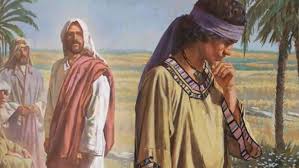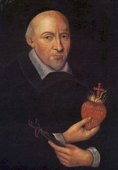HOMILY WEEK 20 01- Year I
Our Journey into Deeper Healing:
Memorial of St John Eudes
(Judges 2:11-19; Ps 106; Mt 19:16-22)
*************************************************
Where are we at on our healing journey?
The readings today fit the two stages of spiritual growth described by St. John of the Cross – the Dark Night of the Senses, and the Dark Night of the Soul, and invite us to place our complete trust in Jesus, practice the spirituality of letting go, and follow him into the experience of eternal life.
The first reading today typifies the first stage. The author of the book of Judges complains that the Israelites, after the death of Joshua, lost their faith and strayed from their chosen path into all kinds of sin, doing evil, abandoning God, idolatry, relapsing over and over again whenever one of the judges died. They were in their early years of their journey, struggling with the Dark Night of the Senses, and in dire need of forgiveness. Only at the end of the reading is there a hint of their need for healing – that of their stubborn self-will.
The rich young man of the gospels, on the other hand, typifies the second stage outlined by St. John of the Cross. He has kept all the commandments and so does not come needing forgiveness. There is something else which is chipping away at his well-being, something he cannot explain but feels deep within: “I have kept all these; what else do I lack?”
 The first thing he lacks is the proper attitude towards the gratuity of God’s grace. He is still locked into the mindset that he can somehow “have” or “earn” eternal life, which is impossible, because it is above all a free gift of the Holy Spirit that can only be given and received, never earned.
The first thing he lacks is the proper attitude towards the gratuity of God’s grace. He is still locked into the mindset that he can somehow “have” or “earn” eternal life, which is impossible, because it is above all a free gift of the Holy Spirit that can only be given and received, never earned.
And when Jesus responds to his question, inviting him to sell all his possessions, we see revealed his other spiritual block – an over-attachment and over-identification with wealth and possessions. In a subtler way than the Israelites in the wilderness, he depends on material wealth to provide meaning and happiness for him. He needs to grow in his trust in the joy flowing from a more intimate relationship with a loving God, and practice the spirituality of letting go. He is struggling with the Dark Night of the Spirit or Soul.
We should not judge this young man too harshly, because in large part, he is us. John’s wife left him partly because of her dysfunctional family of origin, and partly because of her desire to have a large house and flashy car, while he wanted a simple lifestyle, to which he thought she had agreed. As he sorts out his life now, which has been marred by his own dysfunctional family of origin, leaving him afraid of rejection and trying hard to earn the affirmation of others, he has set his sights on two goals – a new relationship, and a better job.
His spiritual director, thinking those particular goals are too much in line with the thinking of the rich young man of the gospels, has encouraged him to place these two goals aside for the time being, and put his focus and energy elsewhere – on opening himself up to believing in and receiving God’s unconditional love for him through contemplative prayer and the Word of God, especially passages such as Isaiah 43:1-4 where God tells us we are “precious and honored in God’s sight” simply because God loves us. John is being challenged to “sell all he has,” put his trust in God and follow Jesus.
I remember myself as that rich young man. In 1976, two years after I was ordained, I attended a charismatic conference in Calgary. At the end of it, everyone else was dancing with joy and enthusiasm, while I felt inexplicably down, sad and puzzled. The next morning, the gospel was about the rich young man, and as I proclaimed it, I realized I am that rich young man! I had just spent the weekend with Jesus and his Body, the Church, and had come away sad.
But I did not know why. I had joined the Oblates, given up my patrimony, did not really own anything, was dutiful, prayerful, living a life of service – so why was I not happier? Part of the answer came during a Christian Ethics class on the masks people wear when the students told me my mask was the “Messiah.” That went along with my workaholism and “Mr. Fix-it” way of being (I would welcome people if they had a problem, but found it difficult to “waste time” just visiting if they didn’t). I realized my possessions, the riches I had to let go of, was my attitude of trying to fix people, of being the Messiah, of doing my will in God’s name, which T.S. Elliot actually named as treason in the play Murder in the Cathedral (“To do the right thing for the wrong reason, is the greatest kind of treason”). I was the rich young man struggling with my own Dark Night of the Spirit, and thank God I was able to surrender and let it go, which made a huge difference in my ministry from that moment on.
 Today the Church honors St. John Eudes, whom I am sure lived those two stages well. Born at Ri, Normandy, France on November 14, 1601, into a farming family, John Eudes joined the Congregation of the Oratory (Oratorians) in Paris in 1623 and was ordained in 1625. Twice during outbreaks of the plague John tended the sick and dying. He also spent years preaching missions, hearing confessions and opposing Jansenism (a belief that only a predetermined few are saved and everyone else damned). In 1641, he helped found a refuge for women with Madeleine Lamy under the direction of the Visitandines, who evolved into a new religious order for women, the Sisters of Our Lady of Charity of the Refuge, with a branch in Canada, the Sisters of Our Lady of Charity of the Good Shepherd.
Today the Church honors St. John Eudes, whom I am sure lived those two stages well. Born at Ri, Normandy, France on November 14, 1601, into a farming family, John Eudes joined the Congregation of the Oratory (Oratorians) in Paris in 1623 and was ordained in 1625. Twice during outbreaks of the plague John tended the sick and dying. He also spent years preaching missions, hearing confessions and opposing Jansenism (a belief that only a predetermined few are saved and everyone else damned). In 1641, he helped found a refuge for women with Madeleine Lamy under the direction of the Visitandines, who evolved into a new religious order for women, the Sisters of Our Lady of Charity of the Refuge, with a branch in Canada, the Sisters of Our Lady of Charity of the Good Shepherd.
Seeing the urgent need for clerical reform, John left the Oratorians in 1643 to found the Congregation of Jesus and Mary (the Eudists) at Caen, composed of secular priests not bound by vows but dedicated to upgrading the clergy by establishing effective seminaries and to preaching missions. John also founded seminaries at Lisieux in 1653 and Rouen in 1659. He shared with St. Mary Margaret Alacoque the honor of initiating devotion to the Sacred Heart of Jesus (he composed the Mass for the Sacred Heart in 1668) and to the Holy Heart of Mary, popularizing those devotions.
John died at Caen on August 19th, 1680. In the decree of his beatification in 1908, Pope Pius X declared John Eudes to be the father, doctor and apostle of devotions to the Sacred Heart and to the Immaculate Heart of Mary. He was canonized in 1925. In the context of a corrupt church (higher clergy were rich and guarded their privileges, and the country was run and wars waged by a cardinal), setting up seminaries to ensure proper education of priests became itself a revolutionary act and the encouragement of devotion to the Sacred heart became not a sweet pious platitude but a defiant proclamation that the center of God’s essence is his love, not condemnation.
The Eucharist is our greatest prayer and act of faith in God’s unconditional love for us, forgiving us and healing us through Word and Sacrament even as we celebrate. May it empower us to trust Jesus totally, practice the spirituality of letting go, and follow him into the experience of eternal life.




Yes, I agree with the readings and reflections about walking a new path that is healing. When we receive the Eucharist during celebrations then we are to follow the word of God . We can experience God’s forgiveness, unconditional love, mercy and healing when we learn to let go and forget all the sins and negative thoughts tempting us to sins. We must learn to let go of our possessions , fame, power and greed to gain God’s love . We should offer ourselves and what we can to help those who are in need, the poor and the sick. We can spend time with the lonely, the sick and the poor by talking to them or offer them food, water and clothing. We should learn to forgive one another as we forgive ourselves . We are to show our love towards others who desperately needs comfort. Also , we need to love our enemies by treating them with respect and dignity. Amen. Many Blessings!
Thanks Bishop Sylvain Lavoie for sharing your stories and reflections about being powerless and and experience Jesus’ healing in all aspects. I still trying to experience all the healing aspects of the Lord. It is a gift and blessing to receive Jesus’ love for us. Gracias! Marci ! Bishop Sylvain .??❤️❤️????